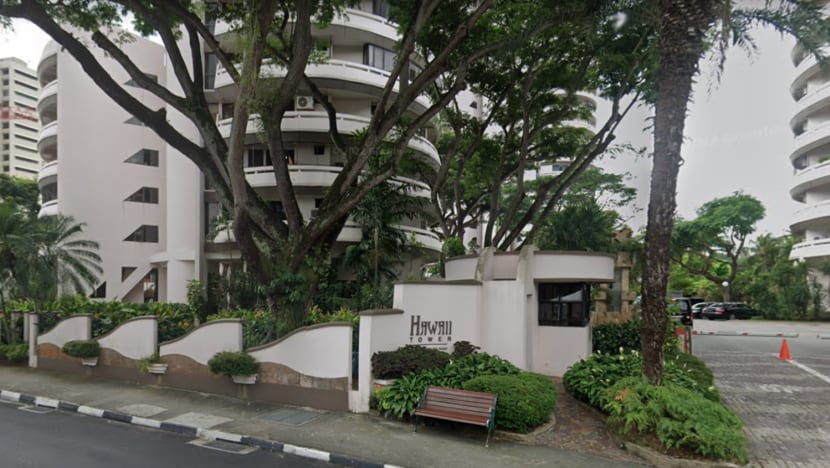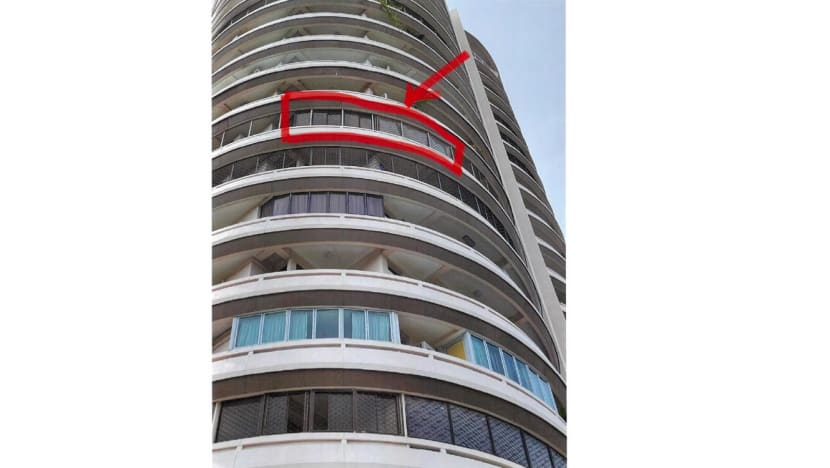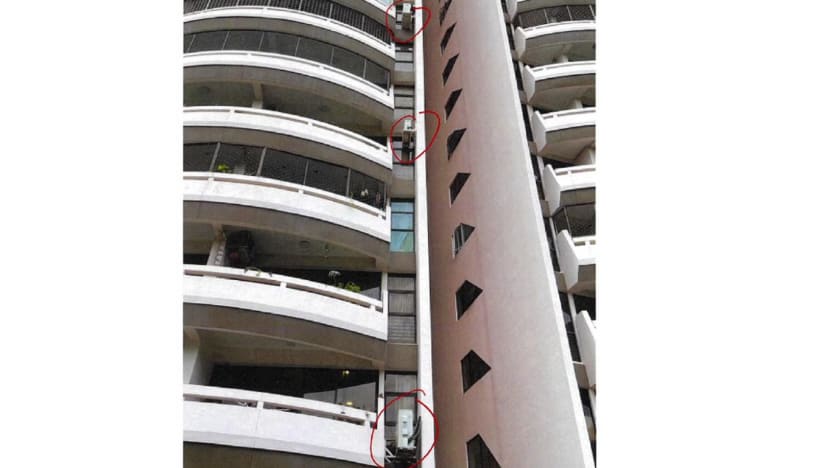High Court allows condo resident to carry out renovation works after management stopped them

Hawaii Tower condominium complex at 73 to 77 Meyer Road. (Image: Google Maps)
SINGAPORE: A High Court judge on Friday (Nov 4) reversed a lower court’s decision to stop a Marine Parade condominium unit owner from carrying out extensive renovation works in his home.
The resident, Prem N Shamdasani, initially sought an order from the State Courts to restrain Hawaii Tower’s management corporation (MCST) from stopping the works, which included installing aluminium-frame glass windows at the edge of his balcony.
The MCST argued that the works not only affected the building’s facade but also its structural integrity. On the other hand, Shamdasani said the MCST was unreasonable in refusing to approve the works.
When a district court judge dismissed Shamdasani’s claims, he lodged an appeal with the High Court to determine if the MCST was justified in not allowing the works.
In a 99-page written judgment released on Friday, Judicial Commissioner Goh Yihan ruled in Shamdasani’s favour, saying that the MCST was “partly responsible for this state of affairs” because it previously allowed other residents to also install window grilles which were not uniform in appearance.
The judge said that the MCST “cannot now hope to reverse the situation”.
“It cannot be heard to insist on uniformity. That boat has long sailed. The horse has bolted.
“Whichever metaphor is used, the fact remains that (the MCST) cannot insist that (Shamdasani) adhere to a dream of uniformity that bears no semblance to reality,” the judge added.

THE CASE
Shamdasani, who has lived in the freehold residential condo development since 1995, applied for approval from the MCST in January 2021 to carry out extensive renovation works to his unit.
However, his application did not include the works that the MCST eventually disapproved of.
In court, he maintained that his reason for not seeking further approval from Hawaii Tower’s condominium manager, Mr Loh Kok Leong, was that he inadvertently forgot to update his renovation form.
These works were:
- Removing the sliding doors at the balconies of the living room and master bedroom
- Installing aluminium-frame glass windows behind approved window grilles along the balcony edge
- Replacing an air-conditioner condenser on the external wall of the building.
He performed the first two works after Mr Loh verbally approved the application, but did not manage to replace the air-conditioner condenser before the MCST stopped all works on Feb 26. It also prevented Shamdasani’s contractor from accessing the unit.
Shamdasani said he could not understand the MCST’s objections because he carried out the same works in his unit on separate occasions about two decades ago, with apparent approval from the MCST.
Shamdasani then asked Mr Loh if he could install foldable and frameless glass curtains, instead of almuminium-frame glass windows, along the balcony of his living room and master bedroom.
He explained that he wanted to keep his unit “safe from dengue” for his elderly relatives, as well as keep out construction noise and dust from the nearby Meyer Rise construction site.
However, Mr Loh rejected the request. He also said that the air-conditioner condenser had to be installed within the unit because having it on the external wall posed a hazard to residents.
When Shamdasani pointed to other units in Hawaii Tower that had air-conditioner condensers similarly installed on external walls, the MCST remained unmoved.

Eventually, feeling like the MCST was unfairly targeting him, Shamdasani asked for records of all owners who had made renovation applications since November 2014.
He had observed that, to begin with, the building's facade was not uniform because other residents installed window grilles and glass windows.
He then found out that 19 units had installed windows at their balconies.
Judicial Commissioner Goh ruled that these 19 unit owners should have sought approval from the MCST but did not. However, the MCST cannot take action against these owners because too much time had lapsed, the judge said.
He added that even though Shamsadani's new windows and air-conditioner condenser did affect the appearance of Hawaii Tower, its external facade was already “far from uniform” due to these 19 units where a wide variety of window grilles had already been installed.
The MCST failed to ensure that these grilles were “in keeping with the appearance of the building”, added Judicial Commissioner Goh.
“Indeed … there are half-grilles, grilles with different patterns, invisible grilles and so forth. This cannot, by any stretch of the imagination, be described as anywhere near uniform,” he added.
“Given that the respondent is partly responsible for this state of affairs by either explicitly allowing the installation of these particular grilles, or not policing the installation of these grilles as it is entitled to under (the Building Maintenance and Strata Management Act), the respondent cannot now hope to reverse the situation.”
In terms of the sliding doors, Judicial Commissioner Goh said they did not affect the building's appearance because anyone standing at a reasonable vantage point cannot see much of the sliding doors, if at all.
The judge also addressed the issue of whether Shamdasani breached two sets of condo by-laws enacted in 1990 and 2014.
He found that Shamdasani breached 2014 by-laws by installing the aluminium-frame glass windows and removing the sliding doors, but not by replacing the air-conditioner condenser.
This meant that the MCST could apply for a court order to stop these breaches, though Judicial Commissioner Goh noted that the MCST did not do this.
As for whether the MCST was empowered under the Act to approve the works, the judge said it was but breached its duty by not having an objectively defensible reason to reject the works.
Because there was no “overarching communitarian need” for the MCST to deny Shamdasani his individual rights to carry out the works, the judge found that Shamdasani should be “allowed to improve his own home to his individual preferences”.









